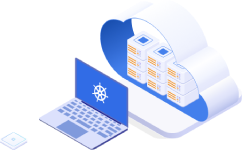IaaS Public Cloud - Cloud Technologies and Cloud Services
The combined cloud infrastructure in Ukraine and Germany is enhanced by Managed Kubernetes extensions and NVIDIA GPU H100 / L40s / L4 tensor accelerators for AI/ML tasks
The public cloud comprises three availability zones: De Novo’s own data centre in Kyiv, along with alternative data centres in Lviv and Frankfurt. This guarantees geographic resiliency and adherence to local data storage regulations.
The cloud possesses a VMware Cloud Verified certificate of conformity, along with international certificates ISO/IEC 27001, 27701, PCI DSS, the state certificate KSZI, and others. The cloud services ecosystem comprises solutions for disaster recovery, backup, cloud storage, and infrastructure status monitoring

Distinct financial advantages
✅ Payments are made in hryvnias at a fixed rate, eliminating the currency risks inherent in global providers, where prices depend on fluctuations in the US dollar exchange rate.
✅ The contract is concluded within Ukraine's legal framework, ensuring transparency and clear obligations to parties.
✅ De Novo guarantees financial responsibility for up to twelve monthly payments as direct compensation in the event of failures, an unprecedented condition in the Ukrainian market.
Migration to and from the cloud

De Novo's team of specialists offers support at every stage of migration and operation of cloud solutions, ensuring the continuity of our client's business processes.
If your specialists require additional competencies to carry out the migration, we handle all aspects of this process.
Our experts guarantee a seamless transition of your services to the De Novo cloud, minimising risk and downtime. You can rest assured that your data will remain secure and the system will function without interruptions.
Enhancing the capabilities of the Public Cloud

Include Kubernetes software
VMware Tanzu Kubernetes Grid enables you to oversee the full lifecycle of K8s clusters from the Cloud Director GUI or through the vCD API (using, for instance terraform).

Connect NVIDIA H100 / L40s / L4 GPUs
NVIDIA's GPU-accelerated cloud enables the execution of artificial intelligence and machine learning (AI/ML) workloads. The GPU virtualisation technology provided by VMware and NVIDIA allows for ordering in increments starting from 1/8 to 1.
Data Protection at De Novo

De Novo provides a comprehensive array of services to guarantee data reliability and security in the cloud environment:
- Flexible cloud infrastructure backup;
- Veeam Cloud Repository available for Veeam users;
- Storage systems compatible with any computing resources used in the De Novo cloud;
- DRaaS — comprehensive recovery solutions for both cloud and local infrastructure in the event of accidents or disasters.
GET A CONSULTATION
Why is the IaaS model useful?
Today, IaaS (Infrastructure as a Service) is one of the most popular and in-demand models for working with cloud services. It allows companies to access virtualized computing resources, such as servers, storage networks, and other infrastructure components, via the Internet. Instead of buying and maintaining on premise equipment, organizations rent IT resources from a cloud service provider, paying only as they use them. The user can install their own operating systems and applications on cloud servers and place and process data in virtualized storage (SDS). In addition, in the operator cloud, you can not only rent individual servers in the cloud and storage systems but also deploy complex IT infrastructures.
This approach allows companies to quickly get started and scale your digital capabilities without large capital investments. Consuming cloud services as a service helps optimize IT infrastructure, increase flexibility and reliability, and reduce costs. Infrastructure as a service can also become a convenient platform for developing, testing, and deploying applications.
What does IaaS cloud infrastructure consist of?
The main components of the operator cloud, “Infrastructure as a Service”, are virtual servers and data storage systems, network components, management tools, etc. Let’s consider them in more detail.
- Virtual servers (virtual machines, VM). This is the basis of any cloud platform. It is an emulation of a physical server on which the user can install their software. You can create, scale and delete virtual servers as needed.
- Data storage. As the name suggests, this is where user data is stored. Cloud storage systems offer different types of storage, including block, object, and file. Block storage is used primarily to host operating systems and applications; object storage is ideal for large volumes of unstructured data (images, videos, backups); file storage provides access to files via network file system protocols.
- Data transmission network. Provides connectivity between various components of the cloud IT infrastructure. Includes virtual private networks, load balancers, firewalls, and other components.
- Controls. IaaS providers provide tools for managing user infrastructure, including creating and deleting VMs, monitoring performance, and access control.
Additionally, as optional services, the operator can offer containerization tools (Docker, Kubernetes), managed databases, backup services, data protection from attacks, etc.
What tasks does the IaaS cloud service solve?
Infrastructure as a Service is a powerful tool that solves a wide range of problems. It provides companies with a flexible and scalable environment for deploying and flexibly managing IT infrastructure.
The main tasks that can be solved using this type of cloud services include:
- Flexible scaling of resources. Rapid scalability of cloud computing power, storage, and network bandwidth based on current load. This is especially valuable for organizations that experience periodic spikes in load.
- Reduction of capital expenditures. Since the entire infrastructure is deployed on the operator's side, the customer does not need large capital investments in the purchase and maintenance of their own equipment (servers, storage systems, network systems).
- Flexible payment. The customer pays only for the resources actually consumed.
- Improving the fault tolerance and reliability of IT infrastructure. Redundancy and backup of key components provided by the cloud operator guarantee high availability of the service and, accordingly, user data and applications.
- Improving business agility. Cloud technologies help companies quickly adapt to market changes and new requirements.
Benefits of Renting an IaaS Cloud from De Novo
Renting cloud infrastructure from De Novo allows you to significantly optimize the operation of the customer's IT infrastructure and, as a result, improve the conditions for business development. In addition to standard advantages, such as no need for on premise data center, flexibility and dynamic scaling of IT resources, adaptation to changing needs, cost efficiency, increased fault tolerance, the operator's cloud provides a number of additional important features. Thus, the operator's IaaS cloud infrastructure meets strict national and international standards in the field of security and data protection - this is important for compliance with all sorts of regulatory requirements.
It is important to emphasize that De Novo concludes a service level agreement (SLA) with its clients, which is an additional guarantee of the quality of the services provided. According to the agreement, the operator's financial liability is up to twelve monthly payments.
The cloud operates in Ukraine, which may be an important factor for companies that need to comply with local data storage legislation (in addition, the operator has another site in Germany, which allows building IT infrastructures of various configurations). Another advantage is a personalized approach to clients, which allows the operator to offer individual solutions that take into account the specifics of a particular organization. As a result, renting cloud resources allows companies to focus on their core business, reduce IT costs, and increase the flexibility and reliability of their digital infrastructure.








